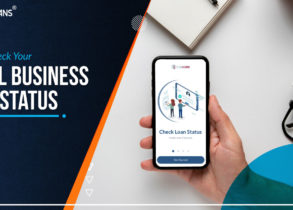Sep 15, 2021
Feb 16, 2026

Introduction
India has a large number of small enterprises spread throughout the country. Financing small businesses is straightforward, but finding a suitable lender for your small business is not. Recently, the government launched several initiatives that make it easier for individuals to finance their small and medium-sized businesses in favourable conditions.
However, this is not the case for everyone. Many small entrepreneurs are unable to obtain loans for new businesses due to the limitation on the classification of businesses. Moreover, banks and non-bank finance companies offer a variety of small company credit products.
How is a Business Loan Defined?
Today’s big question is how do you determine whether your firm is small, medium, or large? It is not the size of the workplace that matters, but the nature of the firm and the annual revenue. Fiscally, a small business is defined as one with fewer than 80 employees and yearly revenue of less than Rs. 10 crores.
When your firm is small or large, obtaining a loan is critical. A small business loan is a subset of the broader idea of business loans. Term loan for business is often the best small business loan. Term loans might be for a short amount of time or for a longer amount of time; in either case, they are the optimal method of financing your small business.
Short-term business loans have a maximum tenure of three years, whereas long-term business loans have a tenure of fifteen years. There are also short-term business loans, in which entrepreneurs are granted overnight loans. However, these do not always benefit small enterprises.
Things to Take Care Of Before Applying for a Business Loan in India
Whenever it comes to a specific business, one should exercise extreme concerns when it comes to borrowings. Even banks must tread very carefully here, given the industry is very new. Obtaining a Collateral Free loan for a business is difficult. The ideal periods to obtain a loan in this instance are as follows:
- When you do not need it, is it a little deceptive? Indeed, when a business is doing well and has been operating for more than two years, taking out a loan is the wisest course of action.
- As previously stated, take loans when you do not require them, i.e., when your firm is profitable and your monthly revenue exceeds 1,50, 000/-.
- If you are between the ages of 21 and 65, this is the optimal moment to seek small business loans.
- Numerous individuals who are now employed yet intend to quit to pursue their endeavours. In this scenario, if the employees have a solid employment history, seeking a loan to sustain the business is a viable alternative.
- You are certain of the business’s future profitability and expansion.
There are instances when it is inappropriate to seek small business financing. These include the following:
- Whenever your business is in a poor position, not performing well, or less than two years old
- When you are either too young or too elderly to manage a business or the associated risk
- If your partners or co-applicants have a criminal record of any type
- If your firm has suffered losses in the recent past, or your business is profitable but has a lower monthly revenue
- You’ve already departed your job and are uncertain about the business’s growth or future
The Ideal Time to Obtain a Business Loan
Once you’ve built a favorable credit score, the ideal time to obtain a GST business loan might be sooner than you believe. Here’s why:
Apply well in advance of when you require the funds
A healthy cash flow is critical for a fledgling firm to avoid financial difficulties – such as excessive reliance on credit cards to cover unanticipated expenditures and day-to-day expenses at exorbitant interest rates.
A line of credit loan can provide some breathing room and flexibility for a startup firm, allowing owners to engage in opportunities that will increase income and foster growth.
Similarly, having access to “rainy day” cash enables business owners to address unforeseen but inevitable expenses rather than deferring them to the detriment of the business.
Waiting an excessive amount of time can be risky
When a business is starving for funds to stay afloat, the optimal time to seek financing is typically six months ago. A struggling business is unlikely to convince a bank to issue a loan, which is why it’s prudent to contact a lender well in advance when you anticipate requiring additional funds.
Naturally, when a firm is going well, a loan or line of credit may not be on your radar – but the most significant moment to inquire is when the books are looking their finest. As a general rule, seek twice as much funding as you anticipate your business will require.
It is always preferable to have access to more funds than you require as a buffer than to have insufficient funds – or to risk not qualifying for further funds later.
Borrow money early to drive growth
When a business is ready to expand, the lack of available capital may be the only impediment. Whether you’re considering purchasing another firm, expanding into new markets, or scaling to serve more clients, speaking with a bank sooner rather than later will help you overcome any financial roadblocks to achieving your future business goals.
Always consider the future
Small business owners can run into difficulties when they attempt to control long-term costs using short-term financing mechanisms such as lines of credit – which can eventually result in cash flow concerns.
Maintain accurate financial records so you can identify the need for longer-term finance early – for example, if you need to invest in new equipment or hire additional people to fulfil next year’s production targets. By applying early, you can protect your funds and short-term finance reserves.
What is a Reasonable Interest Rate for a Business Loan?
Whenever it comes to company loans, rates are often a tricky topic to answer. The business loan interest rate represents the financial institution’s assessment of the risk of non-repayment of the borrowed cash.
Three factors mostly determine this evaluation:
- The borrower’s financial health: Lenders will need to examine the company’s most recent financial documents to determine its profitability. Why? To determine the company’s ability to repay the debt. The lender will need to know the business’s predictions and the rationale for those projections for potential clients.
- The firm’s and its owner’s creditworthiness: Lenders will also consider the company’s and its owners’ track record of repaying previous loans. If a business has outstanding debts, the lender will require that the business has sufficient cash flow to cover both the existing debt and the new loan instalments.
- Collateral amount: It can be used to secure a loan at a lower rate. Collateral is an asset that you own that is accepted as security for a loan by the lender. Buildings, equipment, company automobiles, and invested assets are all examples. Assets that do not depreciate—such as real estate—are preferred over depreciating assets like equipment and automobiles.
Tips to Improve Your Chances of Getting a Business Loan
Do not request quotes from multiple lenders
For many, requesting numerous estimates from multiple lenders appears to be a prudent strategy. In actuality, though, this method may have a detrimental effect on your credit score. When you request quotations from multiple lenders, each of them does a hard inquiry on your credit report at the same time, lowering your credit score by a few points.
You may obtain many quotations from various lenders, but you should use caution. Rather than calling multiple lenders, conduct research to evaluate lenders and contact the one that meets your requirements, expectations, and budget the best. This will save you time and effort, help you maintain a healthy credit score, and increase your chances of loan approval.
Prevent a negative balance
A stable cash flow considerably increases your chances of obtaining a company loan quickly. Lenders are not interested in spotting irregularities in your balance sheet. Cash flow represents your business’s financial potential and ability to repay the business loan you borrow to a lender.
If your balance sheet has unfavorable balance entries, it may become more difficult for you to obtain a loan. Therefore, before applying for unsecured business loans, ensure that your organization operates on a consistent cash flow basis.
Establish a repayment plan
Prepare a strong repayment plan before applying for a business loan. Online business loan EMI calculators can be highly beneficial when developing a payment schedule. While lenders offer customers flexible repayment options to make repayment easier, you may use this calculator to calculate your EMIs and then choose a loan term with an EMI you can comfortably afford each month.
Create and adhere to a budget to make EMI repayment easier. Increase your income and reduce your expenses to save enough money and remain current on your EMI payments. Paying your EMIs on time will not only save you money on late fees but will also enhance your credit score over time.
Conclusion
Small businesses now have more financing alternatives than ever before, but navigating the maze of loan kinds and lenders can make selecting the correct loan and lender for your business tough. Begin your small business funding request only after you’ve considered all relevant elements and circumstances. As each small business is unique, its finance requirements are likewise unique, and we consider everything that may cause you to seek more operating capital. Taking the appropriate form of a small business loan at the right moment will save you time and money in the long run.







